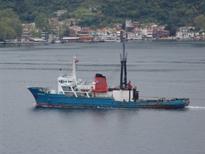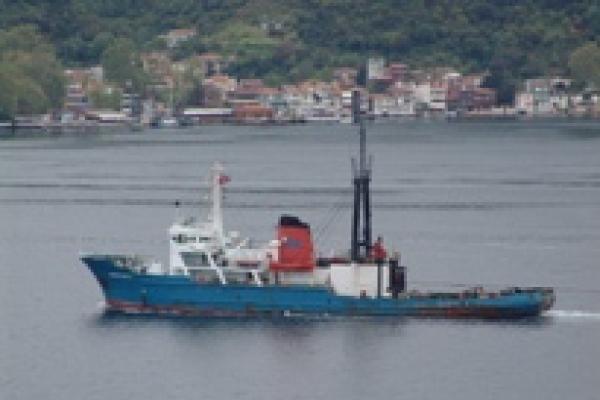
Steamship Mutual
Published: May 01, 2008

In PNSL Berhad v Dalrymple Marine Services Pty Ltd 1 the Queensland Supreme Court of Appeal analysed the requirements for determining whether the towing period had commenced under the UK Standard Conditions for Towage and other Services (Revised 1974) at the time of a collision between a tug and a ship where the tug was approaching to attend. A secondary issue before the Court, the determination of which would only become material to the outcome of the appeal in the event of a finding that the collision in question occurred "whilst" the tug was "towing", concerned whether the limitation of the tugowners' liability under the UK Standard Conditions was rendered void by reason of certain provisions of the Trade Practices Act 1974 (Cth) ("TPA").
Facts
At 7.00am on 28 February 1995, a pilot boarded the bulk carrier “Pernas Arang” to take her from sea to port alongside Dalrymple Bay Coal Terminal. At the time the tug “Koumala” was approximately one nautical mile off the port bow of the “Pernas Arang” and shortly afterwards received an order from the pilot to make fast forward on the starboard bow of the “Pernas Arang”. At the time the order was given, the tide was flooding north to south, there was a low to moderate south-easterly swell and wind was east-south-east at fifteen to twenty knots with intermittent rain showers. Visibility was good. The “Koumala”proceeded to cross from port to starboard ahead of the “Pernas Arang”, then went through a starboard turn in order to come alongside the starboard side of the “Pernas Arang”. During this manoeuvre, whilst the “Koumala”was approximately 150 metres from the “Pernas Arang”and heading towards the “Pernas Arang”’s starboard side at about 5 knots, the “Koumala”’ssteering failed. Approximately two minutes later, the “Koumala”collided heavily head-on with the starboard side of the “Pernas Arang”. The “Pernas Arang” sustained damage from the collision, but the “Koumala” did not. In the meantime, another tug had crossed astern of the “Pernas Arang”from port to starboard and made fast at the starboard quarter.
Arguments before trial judge
The owners of the “Pernas Arang” claimed damages against the operators of the “Koumala”, Dalrymple Marine Services Pty Ltd. The material allegations pleaded in support of the claim for the purposes of the appeal were that (i) the collision was caused by the negligence of the Captain and/or Chief Engineer of the “Koumala” (who were servants or agents of the operators), and (ii) that the operators were in breach of a warranty implied into the contract by s74(1) of the TPA that the towage services would be rendered with due care and skill. The operators denied negligence on the basis that the collision resulted from a failure of the “Koumala”’s starboard generator "the cause of which was not discoverable by reasonable inspection". They also denied that the implied warranties asserted by the owners of the “Pernas Arang”applied to the towage contract. Therefore, as the collision occurred “whilst towing” within the meaning of that expression in the UK Standard Conditions they were exempt from any liability in respect of the collision.
Findings of trial judge
The trial judge found that the collision was caused by the negligence of the Captain of the “Koumala” in failing to stop the main engine sooner than he did, and by her Chief Engineer in failing to switch the power source to the port generator sooner than he did. He then proceeded, in a somewhat roundabout fashion (after first dealing at length with the TPA argument), to conclude that "before the collision the Koumala was not in the requisite position before, when, and after the steering failed to respond to any of the specific orders referred to in the definition of the expression ‘whilst towing’." Therefore, the operators of the “Koumala”were not able to avail themselves of the protection of clauses 3 and 4 of the UK Standard Conditions. As was later noted by the Court of Appeal, having concluded that the collision occurred before the protection of the UK Standard Conditions could be invoked, it was not strictly necessary to deal with the TPA issues. Nonetheless, the trial judge determined that the exemption clauses in the UK Standard Conditions were rendered void by operation of s 68 of the TPA. This was because the disapplication of the implied warranty that the services would be rendered with due care and skill was not triggered due to the fact that a contract for towage services was not "a contract for or in relation to the transportation …. of goods" as contemplated by s74(3). The end result was that the owners of the “Pernas Arang” were awarded damages in the sum of $583,965.092
The appeal
The trial judge's findings that the collision had not occurred "whilst towing" and that the exemption clauses in the UK Standard Conditions were rendered void by the operation of s68 were challenged on appeal by the operators of the “Koumala”; the factual findings of negligence were not contested. The appeal was dismissed, with the Court of Appeal upholding the trial judge's finding on what it identified to be the threshold issue of whether the collision had occurred "whilst towing". In addition, even though in consequence of the ruling in respect of the "whilst towing" point "it was not strictly necessary to consider the issues debated as to the operation of s74", the trial judge's finding in respect of the operation of s74 of the TPA was also approved. The Court of Appeal's examination of both points warrants consideration.
"whilst towing"
In adopting what might be viewed in certain quarters as an overly restrictive construction of "whilst towing" as that expression is defined in clause 1(b)(iv) of the UK Standard Conditions, the Court of Appeal unanimously found on the facts that the “Koumala”was proceeding to but "never reached a position to receive orders direct from the Pernas Arang". That is, at no time prior to being disabled by a steering failure 150 metres off the starboard beam of the “Pernas Arang”had the “Koumala”reached a point of sufficient physical proximity to be considered "within hailing distance" and therefrom commence towing (and trigger the operation of clauses 3 and 4 of the UK Standard Conditions). The Court also found that from the moment of the steering failure until the collision occurred "the Koumala was not in a position to accept orders or carry them out". Despite undertaking a relatively detailed review of the leading authorities, in particular approving the analysis of Brandon J in “The Apollon” 3, there is no specific guidance provided as to precisely why, on the facts, a distance of 150 metres was considered to be outside the geographical range required in order to be in "a position to receive orders direct". Given that the weather conditions prevailing at the time were not exceptional, there is some force in the argument that the decision stands as authority in support of the proposition that as a general rule a distance of 150 metres will be outside hailing distance.
Implied warranties under TPA
As indicated already, having upheld the trial judge's finding on the question of fact as to whether towing had commenced it was not necessary for the Court to deal with the TPA point. Further, in light of the decision of the Full Court of the Federal Court in Braverus Maritime Inc v Port Kembla Coal Terminal 4 in the author's view it was inevitable that the trial judge's finding that a contract for towage services was subject to implied warranties in the TPA would be approved on appeal. Where s74 of the TPA applies there is imported into a contract a warranty that "the services will be rendered with due care and skill" and, by operation of s68, any contractual terms inconsistent with that warranty are rendered void. It was argued on behalf of the operators of the “Koumula” that s74 did not apply to the towage contract because under s74(3) the term "services" does not include a reference to "a contract for or in relation to the transportation … of goods". It was also argued that sub-section (3) was engaged in one of two ways; either the towing was in relation to the transportation of coal which the “Pernas Arang” was to load, alternatively, the towing of the “Pernas Arang” was in itself the transportation of goods. In “Braverus”, it was observed in relation to a contract for pilotage services that such a contract "… was not for the transportation of goods. … The purpose of s74(3) was to ensure that the well-known law governing transportation of goods (by air, land or sea) and storage of goods was not radically amended by s74, in particular given the well established insurance arrangements in respect thereof. … With that purpose understood, there is no relevant relationship between the contract to provide the services and the transportation of goods. It could be no more said that a contract to provide pilotage services related to the transportation of goods because it was a necessary precondition to get the ship to berth, then it could be said that a contract to repair the ship before sailing related to the transportation of goods because, without the repairs, the ship would not sail". The trial judge in this case approved the above analysis as being correct and proceeded to find that "The connexion between the towing contract and the transportation of goods is no less remote than that between the contract to provide the pilot's services and the transportation of goods or that between the repairer's contract and the transportation of goods. There is a connexion, but one lacking a relevant relationship, such as exists in the case of the courier. There is no reason to conclude that the purpose of s74(3) extended to removing contracts like towing contracts from the purview of s74(1) and (2). " The trial judge's analysis and application of “Braverus” was approved by the Court of Appeal.
Ability for Tugowners to limit their liability under the TPA
The application of the rationale in “Braverus” to a contract for towage services confirms that ship owners ought to be aware suppliers of towage services in Australia may seek to incorporate terms limiting their liability to the costs of the services provided as permitted under S68A of the TPA. The inclusion of such a term is a relatively standard feature of service contracts in Australia that are subject to the TPA. However, for the reasons explained above, the inclusion of such a limitation provision would not have assisted the operators of the “Koumala”in this instance as a result of the finding that towing had not commenced.
With thanks to Gavin Vallely of Holman Fenwick & Willan, Melbourne, for preparing this article.
1. [2007] QCA 429
2. It was agreed by the parties that loss and damage should be limited to 167,000 SDRs pursuant to the 1976 Limitation Convention
3. [1971] 1 Lloyd's Rep. 476
4. (2005) 148 FCR 68


